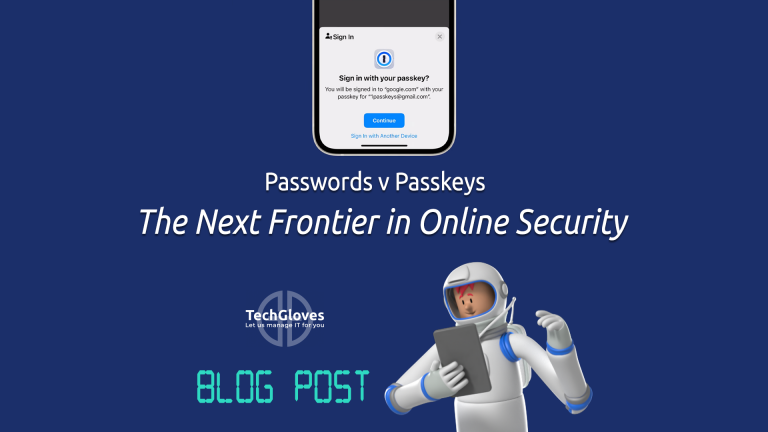Passwords have long been the primary means of protecting our digital lives, but they come with their fair share of issues – they’re often cumbersome to remember, susceptible to breaches, and subject to frequent resets. Fortunately, there’s a promising alternative on the horizon: passkeys.
Here’s a quick look at how passkeys are well on the way to replacing passwords and revolutionize the way we secure our online accounts and data.
The Problem with Passwords
- Weakness to Brute Force Attacks: Passwords, especially short and simple ones, can be cracked relatively easily through brute force methods, where attackers try various combinations until they guess the correct password.
- Phishing Vulnerabilities: Users can be tricked into revealing their passwords through phishing attacks, where malicious actors impersonate trusted entities to steal login credentials.
- Password Reuse: Many people use the same password across multiple accounts, increasing the risk of a single breach compromising multiple accounts.
- Human Memory Limitations: Complex and unique passwords are hard to remember, leading to poor password practices such as writing them down or using easily guessable variations.
- Password Resets: Frequent password resets, often mandated by websites, can be frustrating and counterproductive, as users tend to create weaker passwords when they have to change them frequently.

Enter Passkeys
Passkeys offer a promising solution to these password-related problems. A passkey is a cryptographic key that serves as a digital identity token. Instead of relying on human-generated and memorable text strings, passkeys are generated and managed by a secure system or device. Here’s how passkeys could replace passwords:
- Enhanced Security: Passkeys are significantly more secure than traditional passwords. They are resistant to brute force attacks because they are typically long and generated with complex algorithms. Additionally, passkeys are not easily phishable because they are stored securely and not directly entered by the user.
- Protection Against Reuse: Passkeys are unique to each account and are not meant to be reused elsewhere. This reduces the risk associated with password reuse and makes it less appealing for attackers to target multiple accounts.
- No Memorization Required: Users no longer need to remember complex passwords or resort to writing them down. Passkeys can be stored securely in hardware tokens or managed by trusted applications, making them easy to use and impossible to forget.
- Reduced Need for Password Resets: With passkeys, there’s no need for frequent password resets, which are often a source of frustration for users. Passkeys can be generated and stored securely, reducing the risk of unauthorized access.

Implementing Passkeys
To replace passwords with passkeys effectively, the following steps need to be taken:
- Infrastructure Development: Websites and services should invest in the infrastructure required to support passkeys. This includes implementing cryptographic protocols and ensuring compatibility with various passkey management methods.
- User Education: Users need to be educated about passkeys and the benefits they offer. This includes teaching them how to generate and use passkeys securely.
- Two-Factor Authentication (2FA): Passkeys can be used in conjunction with 2FA for an added layer of security. This ensures that even if an attacker gains access to a passkey, they still can’t log in without the second factor.
- Secure Storage: Passkeys should be stored securely on users’ devices or in hardware tokens. This prevents unauthorized access and ensures that the passkey remains private.
Conclusion
Passwords have been a staple of online security for decades, but their limitations have become increasingly evident in the face of evolving cyber threats. Passkeys represent a promising evolution in the way we protect our online accounts and data. By offering enhanced security, reduced reliance on memory, and protection against common vulnerabilities, passkeys could revolutionize online security in the near future. As technology continues to advance, it’s essential for individuals and organizations alike to embrace these new approaches to safeguarding our digital lives.
Why not let us manage IT for you?
Find more about the services available here and be sure to subscribe to our YouTube channel for more tips, tricks and explainer videos.

